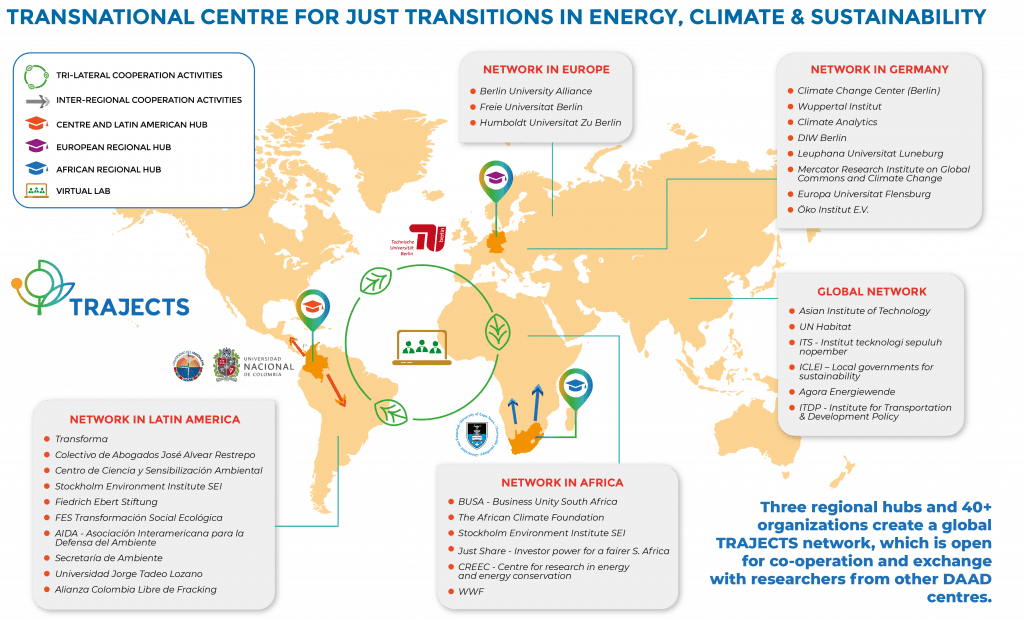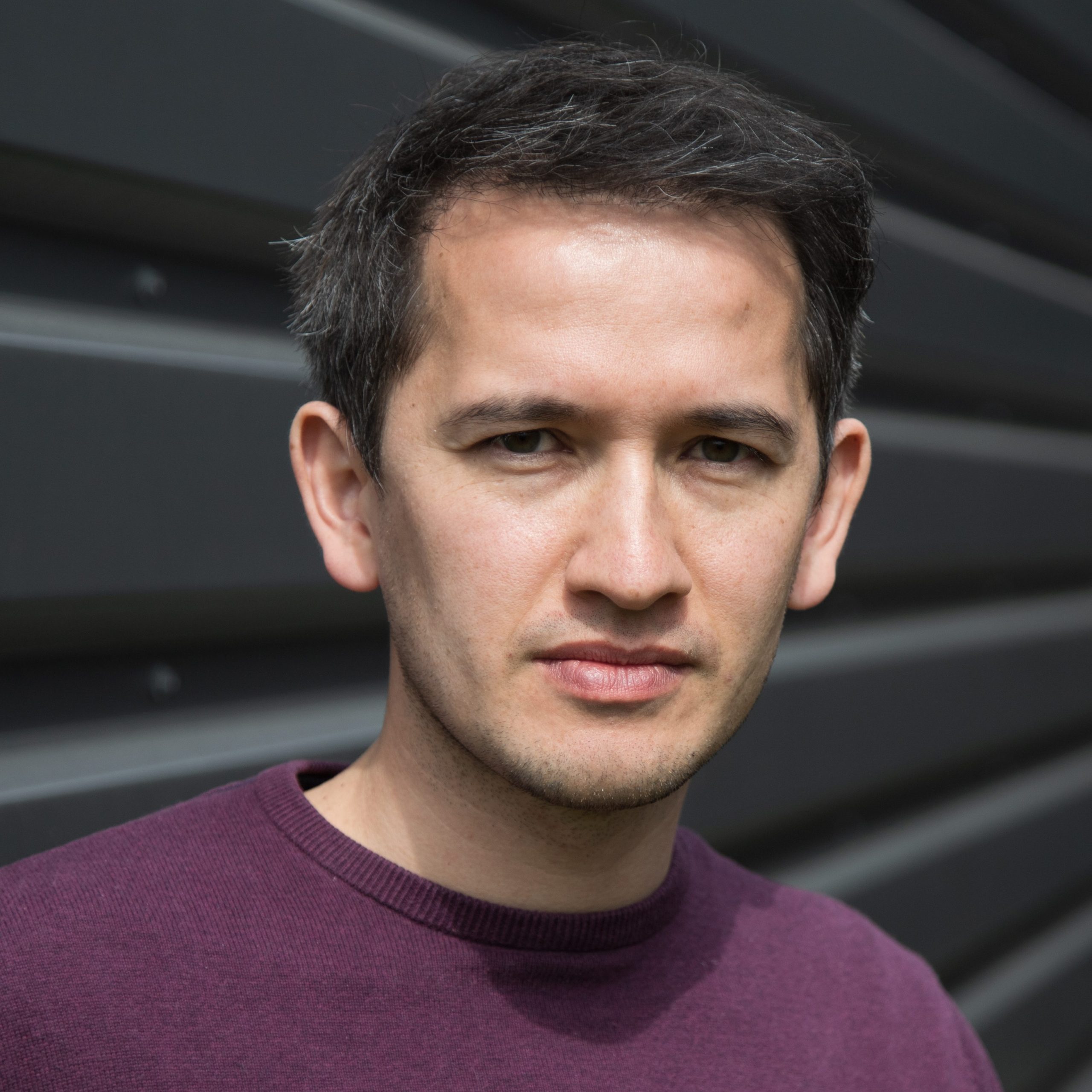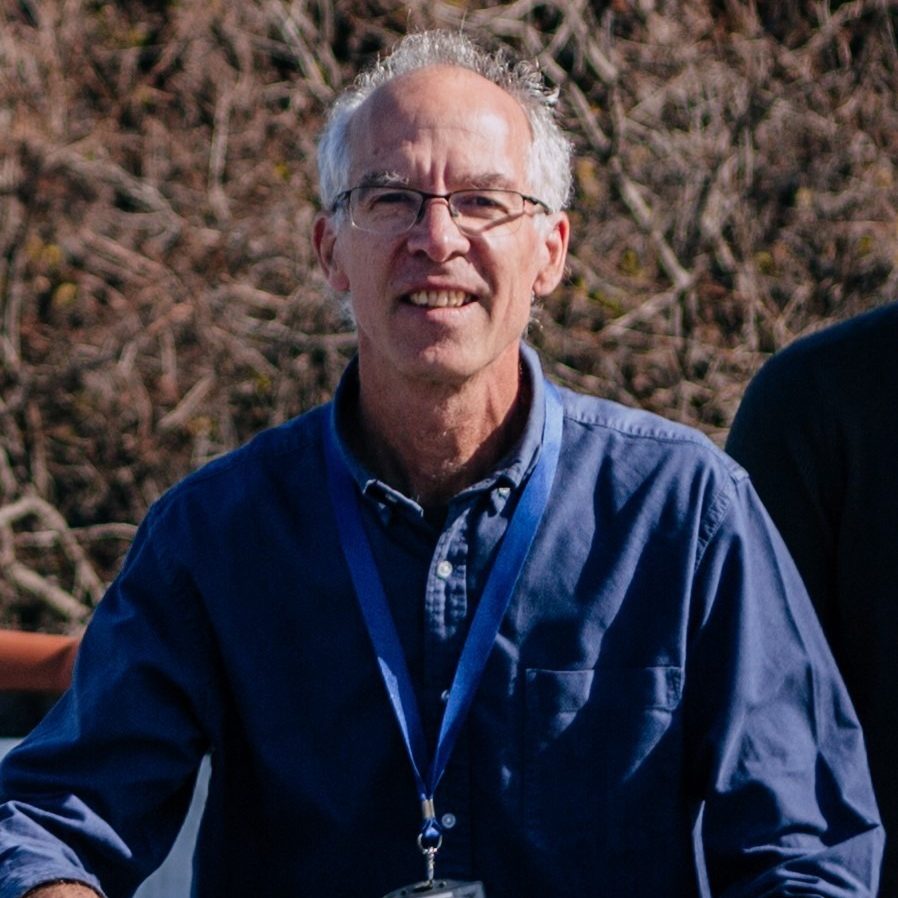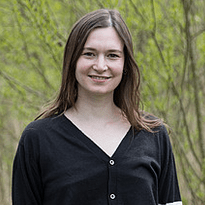TRAJECTS constitutes of three main regional hubs based in Colombia, South-Africa, and Germany:
Aside from the above mentioned regional hubs, Universidad del Magdalena (UMS), Humboldt Universität Berlin (HUB), the Freie Universität Berlin (FUB) and the Europa Flensburg University (EUF) provide additional support as implementing partners. Along with the aforementioned partners, TRAJECTS is supported by a large global network, with over 40 institutions (and growing) in civil society, academia, think-tanks, public administration, and business. The following figure provides a clearer picture of all the organizations involved in TRAJECTS until now.





The Institute of Environmental Studies (IDEA) of the Bogotá branch of the National University of Colombia hosts the TRAJECTS’ regional hub for Latin America and the Caribbean.
IDEA understands the environment as a holistic reality in which ecosystemic and cultural processes interact. Through research, teaching and extension activities framed in interdisciplinary and inter-institutional work, IDEA addresses both conflictive and proactive aspects of the relationship between society and the rest of nature within the context of the development and welfare of society.
The institute contributes to the knowledge of the environment, to the sustainable use of its potential and to the solution of the problems of the tropics to improve the quality of life, through the creation of thought, scientific research and technological development through its training programs (Master in Environment and Development, PhD in Environmental Studies, diploma courses) and the projects it develops in five lines of research: Environmental and Agrarian Studies; Environmental Management; Economy and Environment; Ecology, Environmental Conflicts and Territory; and Environmental Thought and Education.
IDEA’s extension activities also include work with government agencies to intervene, formulate and rethink development policies or legal and administrative provisions, as well as management systems. It is also open to cooperate with private enterprise and NGOs in order to seek new ways to achieve sustainable activity.
The Latin American regional center coordinates from Colombia the academic and administrative activities related to the different exchange and cooperation strategies among the network partners within the region, as well as students and researchers with the intention of moving to or from Latin America.
The National Contact Point (NCP) at UNAL Bogotá is in charge of communication with the members of the Partners Network in the region to promote scenarios and opportunities for the exchange of knowledge and strategies around Just Transitions to Sustainability. The National Contact Point (NCP) at UNAL Bogotá is in charge of communication with the members of the Partners Network in the region to promote scenarios and opportunities for the exchange of knowledge and strategies around Just Transitions to Sustainability.
Instituto de Estudios Ambientales
Calle 44 # 45 – 67
Unidad Camilo Torres Bloque B2. Oficina 24
Universidad Nacional de Colombia
Bogotá D.C., Colombia
+57 (601)3165000 Ext. 1055
In South Africa, the Energy Systems Research Group (ESRG) at University of Cape Town hosts TRAJECTS’ regional hub in Africa.
The Energy Systems Research Group at the University of Cape Town combines modelling of energy and economic systems with policy analysis and field-based research, to generate and enhance knowledge of energy systems at sectoral, regional, national and sub-continental scales, focused on South Africa and the SADC region. Such large systems are known to behave counter-intuitively, and modelling helps to study the interaction of multiple components under changing conditions over longer time periods, providing intelligence needed for policy regulation and on optimal capital investment into costly infrastructure. In SATIM, the group holds the only full energy sector model for South Africa, combining electricity and liquid fuels sectors on the supply side with industrial, transportation and residential users on the demand side. A dynamic linking of this energy systems model with a macroeconomic general equilibrium model allows for economic analysis of energy-system decisions and ensures that inputs to SATIM are based in economic forecasts rather than arbitrarily specified. Specialists cover the main industrial sub-sectors, transport, residential, power generation, coal-mining and renewables. In addition, the group has expertise in modelling on a number of other open-source energy systems platforms. The group in its current format evolved out of the 2019 restructuring of UCT’s Energy Research Centre and holds a combined experience of over 70 person-years.
The African regional hub coordinates the academic and administrative activities from Cape Town, South Africa. The academic coordination involves research collaboration and exchange among the network partners within the region, as well as students and researchers within the African region.
The National Contact Point (NCP) at ESRG in Cape Town, lead on the Masters Programme, the Joint Research Programme and building the regional network on research and engagement on a wide range of ideas and strategies towards Just Transitions and Sustainability.
University of Cape Town / Rondebosch, Cape Town, 7700, South Africa

In Germany, the Workgroup for Infrastructure Policy (WIP), together with the Office for International Projects host TRAJECTS’ regional hub in Europe.
The Workgroup for Infrastructure Policy (WIP) at the Faculty for Economics and Management Science (Fak VII) of TU Berlin is involved in teaching, research, and consulting work on economic policy. WIP has research expertise in the energy, water, and waste disposal sectors.Within WIP, the TRAJECTS academic coordination team is part of the CoalExit research group, which researches socially acceptable frameworks for coal phase-out in Global North countries e.g. Germany, Europe, and its implication is Global South countries e.g. Colombia and South Africa.
The TRAJECTS administrative coordination team is part of the International Projects Section within the Department of International Affairs of TU Berlin. They contribute to TU Berlin’s internationalization by acquiring and successfully conducting strategically effective projects, in close collaboration with other areas of TU Berlin, coordinate TU Berlin’s Strategy for Global Responsibility and are the central point of contact for academic cooperation with partners in the Global South.
The European hub is in charge of handling communication with the funder agency (DAAD), as well as of the academic and logistic coordination between hubs.
The National Contact Point (NCP) at TU Berlin is in charge of liaising with the European Members of the Partners’ Network, partners of the Global Network outside Africa and Latin America, and is the main contact person for outgoing scholarship holders and researchers from those organizations.
Technische Universität Berlin
Fachgebiet Wirtschafts- und Infrastrukturpolitik (WIP) /Workgroup for Economic and Infrastructure Policy (WIP)
Fakultät VII – Wirtschaft und Management / Faculty VII economics and management
Straße des 17. Juni 135 – Sekretariat H 33
10623 Berlin, Germany



DIGI-FACE – Digital Initative for African Centres of Excellence represented by:
University of Applied Sciences Kehl
Kehl Institute of Applied Research (KIAF)
Projects International Cooperation and Development
Kinzigallee 1, D- 77694 Kehl
+49 7851 894143
https://www.hs-kehl.de/
Contact: digiface[at]hs-kehl.de
Developed by Viewport / WordPress Guys
Opt-out complete; your visits to this website will not be recorded by the Web Analytics tool. Note that if you clear your cookies, delete the opt-out cookie, or if you change computers or Web browsers, you will need to perform the opt-out procedure again.
You may choose to prevent this website from aggregating and analyzing the actions you take here. Doing so will protect your privacy, but will also prevent the owner from learning from your actions and creating a better experience for you and other users.
The tracking opt-out feature requires cookies to be enabled.
Not sure which status you have? Have a look at the list below to identify the right role for your profile.
| Cookie | Duration | Description |
|---|---|---|
| cookielawinfo-checbox-analytics | 7 days | This cookie is set by GDPR Cookie Consent plugin. The cookie is used to store the user consent for the cookies in the category "Analytics". |
| cookielawinfo-checbox-functional | 7 days | The cookie is set by GDPR cookie consent to record the user consent for the cookies in the category "Functional". |
| cookielawinfo-checbox-others | 7 days | This cookie is set by GDPR Cookie Consent plugin. The cookie is used to store the user consent for the cookies in the category "Other. |
| cookielawinfo-checkbox-necessary | 7 days | This cookie is set by GDPR Cookie Consent plugin. The cookies is used to store the user consent for the cookies in the category "Necessary". |
| cookielawinfo-checkbox-performance | 7 days | This cookie is set by GDPR Cookie Consent plugin. The cookie is used to store the user consent for the cookies in the category "Performance". |
| viewed_cookie_policy | 7 days | The cookie is set by the GDPR Cookie Consent plugin and is used to store whether or not user has consented to the use of cookies. It does not store any personal data. |
